|
Featured Story, Part Three of a Three-part Series Butler's Web, Part One Butler's Web, Part Two By Christine Gralow Kailua, HI - When current Hawai'i State Senator Mike Gabbard was 29, he sent a letter from American Samoa to a temple in Bombay. It was January 1977, and Gabbard was then Assistant Dean of Instruction at American Samoa Community College. He sought spiritual guidance from A.C. Bhaktivedanta Swami Prabhupada, founder of the International Society for Krishna Consciousness (ISKCON) - better known as the Hare Krishna movement. In the letter, Gabbard described how he was first exposed to ISKCON in 1973, through a chance meeting with a man named Vijay, who stopped in Samoa while on a mission to spread Krishna Consciousness in Fiji. Gabbard wrote that Vijay stayed at the Gabbard family's home in Samoa for a week, introducing the family to ISKCON tenets. Soon after, Gabbard began regularly chanting the Hare Krishna mantra, selling Spiritual Sky incense, and distributing ISKCON's Back to Godhead magazine at Mike’s Sport Shop, his family business in Samoa. Gabbard also described for Prabhupada his travels to ISKCON temples in California, Colorado, Hawai'i, and New Zealand. "The four years since my meeting with Vijay has been a roller-coaster ride," Gabbard wrote in the letter. "By roller-coaster ride: I mean that I can understand why Lord Caitanya and you stress association with devotees." The genuine soul-searching Gabbard expressed in this letter marked an early stage of his family's journey into the dizzying world of Kris (aka Chris) Butler’s Science of Identity Foundation (SIF), a secretive sect headquartered here in Kailua, on O'ahu's Windward Coast. As covered earlier in this series, the SIF network is a complex web of political grooming, shady international financial connections, and alleged cultism. Three long-time, high-ranking Butler followers who have served as SIF financiers – Allan Tibby, Joseph Bismark, and Patrick Bowler - have faced international criminal allegations of money laundering, syndicated estafa (racketeering), and drug smuggling, respectively. In 1977, Honolulu Advertiser investigative reporter Walter Wright uncovered Butler's underhanded involvement in a Hawai'i political party called Independents for Godly Government, which Butler's followers financially floated with mysterious funds. The Move to Hawai'i and Early School Days Prabhupada mailed a reply to Mike Gabbard from West Bengal, India, dated February 18, 1977. "Your idea for starting a Krsna Conscious center in American Samoa is very good," Prabhupada wrote to Gabbard in a letter filed at the Bhaktivedanta Archives in Sandy Ridge, NC, "but first you must be well conversant with our philosophy." Later that year, Prabhupada died in India at age 81. He had wildly succeeded in spreading his Krishna Consciousness movement in the West, even reaching pop culture through George Harrison and The Beatles. His movement had spread especially quickly here in Hawai'i, among the counterculture hippie crowd. After Prabhupada's death, Butler declared himself one of Prabhupada's pure devotees and true disciples, despite having had a brief and rocky relationship with the Indian spiritual leader. (As detailed in part two of this series, Prabhupada actually denounced Butler several times and accused him of criminal activity.) Butler, who has gone by many names, began going by Srila Prabhupada soon after the ISKCON founder's death. In 1983, the Gabbard family moved from American Samoa to Hawai'i, where they became deeply involved with Butler and SIF. Within SIF, Mike Gabbard became known as Krishna Katha das (also spelled Krsna Katha das), and his wife, Carol, became known as Devahuti dasi. Their daughter, current U.S. Rep. Tulsi Gabbard (D-Hawai'i) was just two when the family relocated to Hawai'i. By this time, many of Butler's earliest and most devoted followers had young children. Butler strongly advised against sending the children to public schools or even allowing them to associate with non-SIF children. As a professional educator, Mike Gabbard was charged with running a private SIF school on O'ahu for children of Butler's disciples, the Ponomauloa School. Gabbard's deep spiritual devotion to Butler also soon led to his position as Butler's secretary of personal affairs. Carol Gabbard helped run her husband's Ponomauloa School, and she served as the secretary of a SIF branch in Arizona. In 1984, when SIF's private schools were just starting up, Butler delivered a lecture on education to his disciples in Honolulu. A transcription of this lecture was widely circulated within SIF and leaked to Meanwhile in Hawai'i - along with dozens of other internal SIF documents - by a former Butler disciple who wishes to remain anonymous for fear of retaliation. Three men who grew up within SIF say they recall repeatedly listening to a recording of this lecture as children at SIF schools. Another former Butler disciple confirmed her presence at the lecture and identified others named in the lecture transcription. In the rambling lecture on education, Butler discussed his broken childhood dream of becoming a Major League Baseball player. He claimed his family was driven out of Louisiana and tracked by the CIA when he was a "baby," due to the family's communist and civil rights stances. (As covered in part two of this series, his father, the late Dr. Willis Butler, was, in fact, a far-left political activist with communist sympathies.) Butler also railed against public school teachers in the lecture and discussed his father's disappointment in him when he failed classes as an adolescent. "The teachers aren’t interested in teaching," Butler said in the 1984 lecture. "They’re simply going for their paycheck, which of course you can know by the fact that they go on strike if they don’t get enough money, right? F**k the kids, we want our money, more money, we only make $22,000 a year. You know how hard it is to live with $22,000 a year when you’ve got three cars and four houses?" Butler advised against allowing children to watch television, and he lectured against teaching evolution and history. "Screw the history book," he said. Butler also discussed his interest in politics, addressed "Krsna Katha das" (aka Mike Gabbard) directly during the lecture, and encouraged the children of his disciples to go into politics. "What you’ve got to do is get one of these kids to run for office," Butler said. "Find out why you have to be a certain age to run for office … or a school board." Dark Days - Inside the Baguio Boarding School In the late '80s, in addition to Mike Gabbard's school on O'ahu, SIF began running a remote boarding school for the children of Butler's disciples in Baguio City, Philippines. The school was modeled loosely after traditional Indian gurukuls, where children studied directly with a guru away from home. Unlike traditional gurukuls, however, Butler – the guru – did not reside at the Baguio school or have any direct interaction with the children. In place of direct spiritual and educational guidance from their guru, the students listened to Butler's recorded lectures and bowed to pictures of Butler. Children of Butler's followers from the U.S., Australia, the Philippines, and New Zealand were sent to the school. Butler was "never there," said Ian Koviak, who attended the Baguio boarding school for over four years, from ages 12 to 16. "My mother joined SIF in late 1989 in New York City," Koviak explained in an email to Meanwhile in Hawai'i. "It was not long before we moved to LA, Malibu, where Butler was at the time, and not too much longer after that I went to the Philippines school." Koviak, now 38, said he listened repeatedly to Butler's lectures while at the Baguio school, including the 1984 education lecture. "Some lectures bashed scientists like Carl Sagan and other modern thinkers," Koviak wrote. "Then there were the private tapes that were only for his disciples and close followers. Those went into graphic detail about homosexuality and male on male intercourse." Koviak said the students also watched a video produced by Mike Gabbard's Stop Promoting Homosexuality organization, which included footage of men having sex in public. Koviak said he began seriously reflecting on this school experience and reconnecting with old classmates in 2011, when he started a blog about the school. "I started the blog because I was feeling odd about what we went through," Koviak wrote, "I wanted to see if this was the feeling others shared." Koviak and four other former students of the SIF boarding school all say they were regularly hungry and sleep deprived while at the school. They also all say they spent at least four hours a day chanting, often in a dark room. They say Butler disciples Ramon "Toby" Tamayo and Allan Tibby (aka Acharya das) led the school. The former students emailed school pictures and old school newsletters to Meanwhile in Hawai'i. In one of the newsletters, Patrick Bowler – a long-time Butler disciple and SIF financier who was arrested in 1997 for running a major international hashish smuggling ring – is listed as a cash contributor to the school. While the former students all say their school days involved some traditional classes taught by outside teachers - such as math and grammar – they say the main focus of the school was the SIF philosophy and worship of Butler. Per Butler’s 1984 lecture, they did not take history classes, learn about evolution, or watch television. The men all painted a strikingly dark picture of their experiences at the school, and they all say they have struggled psychologically as adults. Four of the men used the term “indoctrination” when describing the school experience. Only Koviak and Rama Ranson - who has become a vocal anti-Butler critic online - wished to be publicly named. The three other men requested anonymity, because they wish to remain in contact with relatives who still worship Butler, and they fear retaliation. Meanwhile in Hawai'i confirmed these three men’s identities, their parents' status as Butler disciples, and their attendance at the SIF Baguio school. Ranson, also now 38, said his parents sent him and his younger brother to the boarding school in 1993, when he was 14 and his brother was 12. Ranson said he felt "a deep impulse to get out of that school immediately." After two weeks at the school, Ranson said, he exaggerated an illness to "escape," and he was eventually allowed to return home to his father. He said his younger brother, Sudama, stayed at the school, was raised by non-relative SIF members for the remainder of his childhood, and currently closely serves Butler in Kailua. Ranson now runs the website Rama Ranson vs. the Cult. A third man, who attended the Baguio school for four years from ages 11 to 15, said, "We were taught to follow the teachings and words of Butler as if they were the holy divine word itself." "At first it was kinda' cool to go to a new place," the man continued. "But soon I did not like it. We were always hungry. I almost committed suicide when I was there. I really wanted to go home but was told that my parents did not want me to go back home." The students were taught that, "Fag**ts are taking over and doing disgusting things," the man said. He also told Meanwhile in Hawai'i that he reported sexual abuse at the school and was accused by school leaders of lying about it. A fourth man, who attended the school for a year in the early '90s said, “We were taught Butler and [his wife] Wai Lana were the only true messengers of God, and serving them would be the ultimate mission in life." "They strip you of your individual identity," the fourth man said, recalling his memories of the SIF boarding school. "They humiliate you, try to figure out your strengths and weaknesses. You weren’t allowed to talk to any outsiders. You were not allowed to contact your family." "Everything we did there was in preparation for whatever they wanted us to do next." A fifth man who attended the Baguio school in the early '90s said he suffered from depression and addiction as an adult after realizing that his guru, Butler, did not love him. Three of the men also attended Mike and Carol Gabbard's SIF school on O'ahu, the Ponomauloa School. They said the O'ahu school was "more mellow" than the Baguio school. Children lived at home with their parents while attending the Gabbards' school, the men said, but they were still taught to worship Butler, and they were repeatedly exposed to sexually graphic, anti-homosexual material. One former student said the Gabbards were at times good teachers, but all school lessons essentially tied back to Butler's philosophies. "I know nothing of U.S. history or world history," one of the former students wrote in an email to Meanwhile in Hawai'i. "I am just now reading poems and books, like Catcher in the Rye, one would normally read in school." The men all say they believe SIF's schools in the Philippines are now run more responsibly, but one man said there is still a "full on indoctrination school" in Bukidnon, Philippines, called Madana Mohana Academy. The Madana Mohana Academy's website advertises its service to underprivileged children from preschool through 12th grade. The school claims to be "non-sectarian." The website includes a quote by Jagad Guru (aka Butler) and refers to him as "a renowned philosopher and educator." Children can be seen bowing in front of a large, framed picture of Butler in a video shared publicly on the Madana Mohana Academy’s Facebook page. Mike Gabbard did not respond to inquiries from Meanwhile in Hawai'i. Neither did the Science of Identity Foundation. Tulsi Then and Now The five men who attended the boys' boarding school in Baguio City all say there was also a SIF girls' boarding school in the Philippines at the time. They all believe Rep. Tulsi Gabbard attended the SIF girls' school as a teenager in the '90s. Two of the men say they also grew up around Rep. Gabbard on O'ahu. Male and female students were strictly separated at the Philippines boarding schools, per Butler's instructions, the men say. Rep. Gabbard has been strikingly evasive with journalists and constituents regarding her continued close discipleship with Butler and her teenage years in the Philippines. Though it seems she has removed mention of the experience from her official biography, several articles referencing her "two years spent at an all-girls missionary academy in the Philippines" can still be found online. A Nov. 2017 article on Rep. Gabbard in The New Yorker also mentions that, "as a girl, she spent two years in the Philippines, at informal schools run by followers of Butler." (It is also clear from the The New Yorker article that Rep. Gabbard was less than forthcoming with the reporter regarding her relationship with Butler and SIF.) Other than these two mysterious years in the Philippines, Rep. Gabbard was home-schooled as a child by her parents. Her ex-husband, Eduardo Tamayo, is the nephew of Ramon "Toby" Tamayo, who ran the Baguio City boys' school. Her current husband, Abraham Williams, is also a second generation Butler disciple. So are at least three of her current, key Congressional staffers, including Chief of Staff Kainoa Penaroza, whose father, William Penaroza, chaired a Butler-connected political party in the '70s called Independents for Godly Government. At least two of Rep. Gabbard's current Congressional staffers are first generation Butler disciples, including her mother-in-law, who manages her Honolulu office. Rep. Gabbard did not reply to multiple inquiries from Meanwhile in Hawai'i. Mike, Carol, and Tulsi Gabbard all began their political careers at roughly the same time, in the early 2000s, ostensibly following Butler’s advice to go into politics – "or a school board." They all demonstrated strong anti-gay and pro-environmental agendas at the time, reflecting Butler and SIF's views. Carol Gabbard won a seat on the Hawai'i State Board of Education in 2000. Her agenda as a school board member included supporting private schools and opposing efforts to protect gay students from harassment in public schools. Tulsi Gabbard supported her mother's apparent effort to whitewash the school harassment problem, telling The Honolulu Advertiser in 2004 that figures released by her mother proved, "our schools are not rampant with anti-gay harassment." Mike and Tulsi Gabbard both won local elections in 2002 – Mike as a Honolulu City Councilmember and Tulsi as a member of the Hawai'i House of Representatives. At 21, Tulsi Gabbard was the youngest legislator in Hawai'i's history. In 2004, Mike Gabbard ran as a Republican and lost the race for the Congressional seat his daughter now holds. He campaigned heavily against same-sex marriage, and his daughter vocally supported his efforts at the time. He won a seat in the Hawai'i State Senate in 2006. In 2007, he switched from the Republican to the Democratic Party, causing significant controversy within the Hawai'i Democratic Party. Tulsi Gabbard joined the Hawai'i Army National Guard in 2003 and served two tours of duty in the Middle East. She ran successfully for her current Congressional seat as a Democrat in 2012, and she won re-election in 2016. She began publicly stating that she supported same-sex marriage equality during her 2012 Congressional race. Her voting record on the issue has since been consistent with that stance. Rep. Gabbard raised eyebrows within Hawai'i's LGBTQ Caucus, however, when, in 2015, she reportedly told an Ozy journalist that although she officially supported the legalization of same-sex marriage, her "personal views haven't changed" regarding homosexuality. And just last month, The New Yorker reported, when asked about Butler, Rep. Gabbard said, "I've never heard him say anything hateful, or say anything mean about anybody." To former Butler disciples like Koviak and Ranson - who say they grew up repeatedly hearing profane, hateful comments from Butler - that statement is hard to stomach. "It's silly to even conceive that she never heard her own guru's rants and raves about 'fag**ts and homos,'" Koviak wrote. On the campaign finance front, Federal Election Commission data show Rep. Gabbard's 2012 Congressional campaign received significant backing from individuals within Butler's SIF network – many of whom also donated to her father's 2004 and 2006 Republican campaigns. Rep. Gabbard's more recent campaign finances suggest a move away from financial dependence on the SIF network and toward a network of individuals tied to India’s far right-wing Hindu nationalist Bharatiya Janata Party (BJP). Rep. Gabbard spoke and fundraised at Overseas Friends of BJP events in Los Angeles and Atlanta in 2014. Rep. Gabbard gained national popularity within progressive Democratic circles – including calls for a 2020 Presidential run – after she resigned from the Democratic National Committee in early 2016 to support Bernie Sanders' Presidential bid. She has also, however, faced recent criticisms for her perceived Islamophobia and support of foreign dictators, a perception fueled by her international activities and social media posts. In the past four years, Rep. Gabbard has been criticized for opposing U.S. efforts to hold Indian Prime Minister Narendra Modi accountable for alleged human rights abuses against Muslims in India; tweeting in support of Vladimir Putin's military campaign in Syria while criticizing Obama for not taking military action in Syria; insisting that Obama use the phrase "Islamic extemism"; traveling with Rep. Dana Rohrabacher (R-Calif.) to meet with Egyptian President Abdel Fattah el-Sisi; and - perhaps most infamously - traveling to Syria with Syrian Social Nationalist Party escorts to meet with Bashar al-Assad. Curiously, this reporter also learned last month that D.C. publicist Chris Cooper of The Potomac Square Group was hired to write a letter on Rep. Gabbard’s behalf in July 2017 to a mainstream news editor here in Hawai'i. The apparent intent of the letter was to discredit this reporter and prevent this series from being published in Hawai'i's mainstream news media. Incidentally, in 2016, the same Chris Cooper was hired by Russian lawyer Natalia Veselnitskaya’s Human Rights Accountability Global Initiative Foundation (HRAGIF) to promote a Russian docudrama aimed at reversing U.S. sanctions against Putin and his financial associates. Veselnitskaya and HRAGIF also happen to be at the heart of the U.S. Justice Department’s current Special Counsel investigation into Russian interference in the 2016 Presidential election. While this may simply be a coincidence without nefarious connections, it seems an odd professional choice - considering recent questions about Rep. Gabbard's loyalties - to hire a publicist with such ties. Neither Rep. Gabbard nor Cooper responded to questions about the letter. --------------------------------------------------------------- Note: Sen. Mike Gabbard did not respond to two emails from Meanwhile in Hawai'i regarding his January 1977 letter to Prabhupada. Meanwhile in Hawai'i confirmed the factual contents of the letter. Two sources with deep inside connections to SIF and Sen. Gabbard also confirmed the authenticity of the letter. The letter was leaked to Meanwhile in Hawai'i by a former Butler disciple. As mentioned above, Prabhupada’s letter of response to Sen. Gabbard is on file at the Bhaktidevdanta Archives in Sandy Ridge, NC.
27 Comments
Featured Story, Part Two of a Three-part Series See: Butler's Web, Part One by Christine Gralow KAILUA, HI - To his disciples, Kris Butler is a bona-fide Bhakti yoga guru who has helped them live healthy, God-centered lives free of drugs, meat, and sexual deviance. To his detractors and former disciples, he is a deeply homophobic cult figure who has misappropriated ancient Bhakti tenets to achieve financial and political power. In the Bhakti yoga tradition, which stems from India's Southern Tamil Nadu region, yogis practice loving devotion to a personal God. The practice reached Hawai'i in the late 1960s with the International Society for Krishna Consciousness (ISKCON), to which Butler briefly formally belonged in his 20s. As detailed in Part One of this series, Butler's disciples have included at least five elected officials in Hawai'i, and his Science of Identity Foundation (SIF) maintains legally questionable international financial ties. Butler's most politically successful disciple, U.S. Rep. Tulsi Gabbard, grew up deeply within SIF's fold and remains actively involved. Her father, Hawai'i State Sen. Mike Gabbard, ran a SIF school and served as Butler's personal secretary in the 1980s. At least five of Rep. Gabbard's current, key Congressional staffers are also Butler disciples. While Butler and SIF have remained largely unresponsive to local press inquiries amid Rep. Gabbard's national political rise, former Butler disciples have grown increasingly vocal about negative experiences, and mainland reporters have begun to ask questions. Gabbard's political supporters – including those hoping she'll make a 2020 U.S. Presidential run – argue that her relationship with Butler will prove no more politically significant than Barack Obama's relationship with his former pastor, Jeremiah Wright, proved. Reporter Kelefa Sanneh, who has explored both relationships in articles for The New Yorker, wrote in his Nov. 2017 profile piece on Gabbard, "But Wright represented only a small slice of Obama's life, whereas Gabbard's life would be unrecognizable without Butler's influence." Rick Alan Ross, who runs the New Jersey-based Cult Education Institute (CEI), says he rarely receives complaints about leaders of Hindu-based organizations, but he has received many complaints about Butler. CEI's discussion thread on Butler and SIF contains significantly more posts than other threads, and the discussion has been ongoing for 14 years. While some posts on the CEI discussion board contain inaccurate information, others include verifiable documents detailing the history of Butler's activities. Former SIF members have joined the CEI discussion forum to express concerns about Butler's political involvement, his treatment of disciples, and his hatred of homosexuals. Current SIF members have joined the discussion to claim religious bigotry and defend Butler as a benevolent spiritual leader. Locals here in Kailua - where SIF is headquartered - have chimed in with evidence of Butler's apparent eccentricities, such as the aluminum foiled walls in his home and his requirement that disciples wear respirator masks in his presence. "I think it would be easier if he wore the mask," suggested one CEI discussion forum user. CEI's Ross began researching fringe religious groups in the 1980s, after he learned his grandmother had been targeted for recruitment by Jews for Jesus missionaries at a nursing home. Ross has since served as an expert witness in court cases involving accusations of cult indoctrination, and he controversially consulted with the FBI on the siege of the Branch Davidian Waco complex. Ross said he differentiates between benign and destructive cults, and he has concerns about SIF, which he called, "the fringe of the fringe." "Objectively speaking, Butler has become a very powerful man in a fashion not unlike [the Unification Church's] Sun Myung Moon," Ross said in an interview with Meanwhile in Hawai'i. "Subjectively, some people consider him a psychopath." Childhood and Sibling Rivalry The son of a plantation doctor, Butler was born in Louisiana in 1948 and spent most of his childhood on Moloka'i and O'ahu islands. Though born Kris Butler (no middle name), he has often spelled his first name Chris. His father, the late Dr. Willis Butler, was well-known locally for his far-left political activism and his staunch opposition to U.S. involvement in foreign regime change wars, which he considered counterproductive. Dr. Butler was particularly concerned about U.S. funding of groups in Central America that he viewed as terrorists. Childhood classmates and his older brother Kurt say Kris was an average student, a solid surfer, and a star Little League shortstop. He may have taken his first guru name (Sai Young) from professional baseball pitcher Cy Young. He told the Honolulu Advertiser in a 1977 interview that he got into a lot of trouble as a teenager and was expelled from Kailua High School. He attended Kalani High School for his junior and senior years, graduating in 1966. Maui resident Kurt Butler says his younger brother Kris was "a playboy type" in high school, "very popular with the girls." "Popular with the wahines," agreed an old Kalani High School classmate and current O'ahu resident, who asked not to be named for fear of retaliation. "I remember when Kris showed up, I lost my best buddy. She was just fascinated by him. She pretty much disappeared. Everything was suddenly all about Kris. He had these piercing eyes and this intense way of looking at you." After high school, Kris Butler began classes at U.H. Manoa. He became deeply involved in the late-'60s psychedelic counterculture scene in Honolulu, heavily exploring hallucinogenic drugs (as documented in his 1970 booklet, Sai Speaks). He also explored yoga and meditation for a few years before he dropped out of college, started going by Sai Young, and declared himself a guru in his early 20s. Kurt and Kris Butler have long been estranged, and Kurt says they are "philosophical polar opposites." Kurt said in an interview with Meanwhile in Hawai'i that he believes Kris rebelled against their non-religious, communist-minded father by embracing religious fundamentalism and right-wing politics. Kurt said he disagrees with his brother's portrayal of himself as a guru, and he expressed concern for his brother's followers. "He is indoctrinating his followers into a life of know-nothingism and ignorance, while giving them the delusion that they know everything that really matters," Kurt Butler said of his brother. Kurt also said his "biggest beef" with Kris - back when they still communicated - was Kris’s staunch anti-science stance. "He used to believe there is abundant life on the moon, because the scriptures say so," said Kurt. "Ergo, the U.S. moon landings must be a hoax. I don't know whether he still believes such nonsense." Despite calling his organization "Science of Identity," Kris Butler has, in fact, delivered dozens of decidedly anti-science lectures. In one recorded lecture, he mocked Carl Sagan and science experiments. In another, he stated, "There is no evidence that life has ever been created from matter." Though the lectures are from the 1980s and '90s, SIF still actively promotes them online. Early Guru Days In 1970, A.C. Bhaktivedanta Swami Prabhupada's movement to spread Western love for the Hindu deity Krishna was four years old and spreading quickly in Hawai'i; men in orange robes with shaved heads and tiny pony tails chanted "Hare Krishna, Hare Rama" on the streets of Waikiki; George Harrison released his ISKCON-inspired hit single, "My Sweet Lord"; Kris Butler was a self-proclaimed guru at 22; and Janice Wolf was a 23-year-old religion writer for The Honolulu Advertiser. As Butler's following approached about 50 young adults living communally on Maui and O'ahu, he crossed Wolf's radar. She found Butler and his early devotees living in a Quonset hut in Sunset Beach, on O'ahu's North Shore. In her July 1970 article, Wolf called Butler the group's "dictator." The headline read, "Absolute power over devotees … One man rules Haiku Krishnaites." Wolf, who later became an attorney and the administrator of Hawai'i's courts, interviewed two of Butler's young, female followers. She reported that they told her they did whatever Butler instructed them to do, they did not ask why, and they said they would kill anyone who attacked Butler. Wolf also reported that Butler had arranged the marriage of an 18-year-old (coincidentally named Tulsi) to a man who did business for Butler on the mainland. In response to Wolf's article, several Butler followers wrote letters to the Advertiser defending Butler and criticizing Wolf as close-minded and uptight. In an interview with Meanwhile in Hawai'i, Wolf, now a children’s rights attorney in Nevada, asked, "So is Kris Butler still around?" When told Butler now claims thousands of disciples, including a Hawai'i State Senator and a U.S. Congresswoman, Wolf replied, "You're kidding me. I totally didn't see that coming." Wolf said she recalls having "no preconceived notions" about Butler’s group when an Advertiser editor assigned her to write about them in 1970. She said she "didn’t expect to express negativity," but when writing the article, she "kept coming back to cult." "He was very good looking and knew it," Wolf said of Butler. "Very charismatic, a chick magnet. All these young people just worshiped him. He was the center rather than the religion. I remember walking away thinking, 'There’s something icky about this.'" "I didn’t see Butler as a spiritual person." Wolf added. "I saw him as living the good life with all this power and control. I never expected to hear he had thousands of followers. I guess I really underestimated that one, but I didn’t see how they could support themselves." ISKCON Days Two months after the Advertiser published Wolf's article, a reader who identified as "Mrs. Joseph Ryan" expressed further concern about Butler in a letter to the editor. Mrs. Ryan critically compared two talks she reported having attended – one by ISKCON founder Prabhupada, the other by Butler. Mrs. Ryan wrote that she enjoyed Prabhupada's talk and found him to be wise and well-versed in Sanskrit passages from the Bhagavad Gita. She wrote that a week later, she attended a Butler talk, where she reported encountering a group of teenagers - some she thought to be as young as 15. She described her attempt to discuss the Bhagavad Gita with Butler. "Apparently, he hadn’t read it," Mrs. Ryan wrote. And, just two months after that, in November 1970, Prabhupada wrote a letter from Bombay to one of his disciples in Honolulu, named "Govinda dasi." Prabhupada discussed his fondness for Hawai'i, and he instructed Govinda dasi to widely circulate a letter about Butler. "I authorize you to print them profusely and distribute to the public so that the misunderstanding created by [Butler] may be dissipated," wrote Prabhupada in the letter historically preserved at the Bhaktivedanta Archives in Sandy Ridge, NC. It was a denouncement. The next month, Wolf reported that Butler's group was disbanding and joining ISKCON. "The Swami recently wrote a public letter denouncing [Butler's group] and disclaiming any affiliation with them," Wolf reported in December 1970. Wolf also wrote that the event "marked the end of a growing rivalry between two Hare Krishna groups here." Butler promptly renounced all of his disciples, gave a reported $28,800 to Prabhupada, and flew to California to join ISKCON’s San Francisco temple. Wolf reported that at least 35 of Butler's early followers also joined ISKCON at the time, and they were sent to various cities around the world as ISKCON missionaries. Soon after Butler joined ISKCON, Prabhupada encouraged him to recruit lost hippies. "In your country there are so many confused young men and girls known as the hippies," Prabhupada wrote to Butler in 1971, "and if you work very steadfastly I am sure a tremendous advancement can be done in our missionary activities." By 1972, Prabhupada and Butler's relationship was already on the rocks again, with Prabhupada accusing Butler of being "detrimental" to the "disciplic succession." The Butler/ISKCON rivalry was apparently not yet over. Other letters on file at the Bhaktivedanta Archives detail how Butler traveled to New Zealand and Australia during his time with ISKCON. In New Zealand, Butler began what would become a long-time business/spiritual partnership with David Muncie, aka Tusta Krishna das. Around this time, another New Zealander, Patrick Bowler, also began a close relationship with both Muncie and Butler. Bowler, aka Paramahamsa das, would later become SIF's primary financial supporter in the '80 and '90s. (Bowler would also, incidentally, get arrested in 1997 for running a major, decades-long international hashish smuggling ring.) In 1973, Prabhupada wrote that Butler and an associate had stolen and sold ISKCON's Hawai'i temple and "went away with all the money without taking any permission from me." Prabhupada seemed equally upset by Butler's abandonment of "the beautiful Tulasi plants" at the temple. This was "a great fall down on their parts," Prabhupada wrote of Butler and his associate in 1973. "It is actually a criminal act … anyone who follows them will also fall down without a doubt." Later letters suggest Butler and his associates appeased Prabhupada financially. "Whenever they see me they give me money," Prabhupada wrote in 1975. "So they are not against me. It is a natural thing for the brothers to fight." On their side, Butler and his associates claimed threats were made against them from within ISKCON's leadership. Prabhupada dismissed the claims. The archived letters do, however, refer to ISKCON "strong men." Independence and Political Organizing By the mid-'70s, Butler was back to running his own guru show in Hawai'i. He and his followers began cultivating land on Kaua'i and the Big Island, creating impressive fruit and vegetable farms. Despite Prabhupada's multiple denouncements, Butler continued to expand and tighten his following in Hawai'i. To some, the ISKCON controversy only boosted Butler's reputation as a maverick guru, free of bureaucracy and stifling traditions. Others recall the mid-'70s rift between Butler and ISKCON becoming overly dramatic in Hawai'i, with each side harassing the other and taking paranoid measures to protect themselves. Not long after Prabhupada's death in 1977, Butler’s followers began calling him Prabhupada. Also in 1977, Honolulu Advertiser investigative reporter Walter Wright was on Butler's trail. Through the course of his investigation, Wright began to see clearly what had eluded his Advertiser colleague Janice Wolf in 1970 - that Butler's group had staying power. While Wolf had certainly seen the intense hold that Butler had on his followers – a hold so strong they were willing to do anything for him - she never imagined they would organize and enter politics. In a hard-hitting, three-part investigative series, Wright exposed Butler's close ties to a new political party called Independents for Godly Government (IGG). Wright uncovered how IGG candidates William Penaroza and Kathy Hoshijo were Butler disciples, as were the other IGG candidates. Although none of the IGG candidates won election that year, Wright was struck by the group's political ambitions. "It is just the beginning," Wright reported of the Butler group's political movement in 1977. Wright also wrote that the IGG party's significant connection to Butler had gone unreported during the 1976 election, because, "The news media didn’t dig hard enough, and several candidates skillfully ducked and dodged the questions." Regarding the IGG candidates' 1976 campaign finances, Wright reported that an unusually high percentage of the strikingly few people who had funded the campaigns were connected to a budding health food business called Down to Earth (the same store now owned by QI Group, covered in Part One.) Wright's campaign finance analysis also found that the legality of Hoshijo's campaign contributions fell in the "mathematically impossible" range. "The Advertiser was no more successful this year than last in determining precisely where the major contributors to Hoshijo and IGG got their money," Wright reported. Wright, now retired, recently discussed his 1977 reporting in an interview with Meanwhile in Hawai'i. He went straight to the mysterious finances. "What struck me was the small, very tight, intricate network of business and politics," Wright said. "Almost all the money was coming from about 20 people." Wright also recalled how, as a reporter, the Butler/IGG story felt, "so big and had so many tendrils," and he commented on the "worrisome cult aspect." "And just soaring right out of that stuff now is Tulsi," Wright added. When given copies of his investigative articles from 40 years ago, Wright read them and replied, "Damn I was good." And he was. ___________________________________________________ Butler's Web, Part 3: Grooming the Second Generation Note: Neither Rep. Gabbard nor Butler responded to requests for interviews. Last week, Meanwhile in Hawai'i reviewed a letter purportedly written by a Washington, D.C., publicist hired by Rep. Gabbard. The letter is signed by Chris Cooper of The Potomac Square Group. It states that if Cooper has "anything to say about it, Tulsi will not cooperate with Ms. Gralow." Cooper also claimed in the letter that Gralow "is not a reporter." The rather mysterious letter contained an odd number of grammatical and factual errors, yet Cooper emphasized his eleven years of experience with the Wall Street Journal. Gralow has taken the position that if Rep. Gabbard actually paid for this letter, she deserves a refund. Cooper was apparently trying to convince an editor at another news organization not to publish Gralow's work. Meanwhile in Hawai'i attempted to contact Cooper twice and received no response. Meanwhile in Hawai'i continues to welcome all perspectives and has a policy of swiftly correcting and apologizing for any errors. Meanwhile in Hawai'i encourages readers to report typos or factual errors when found. Mahalo for reading. |
About
|

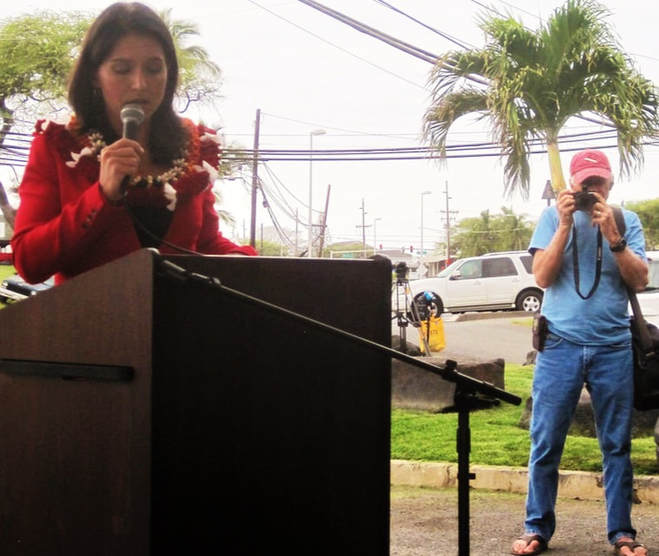

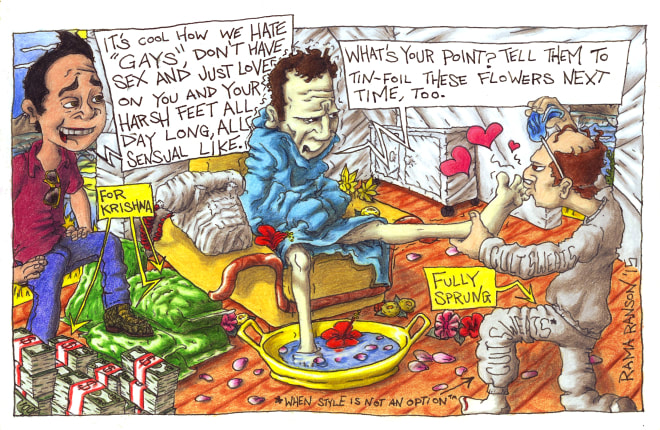
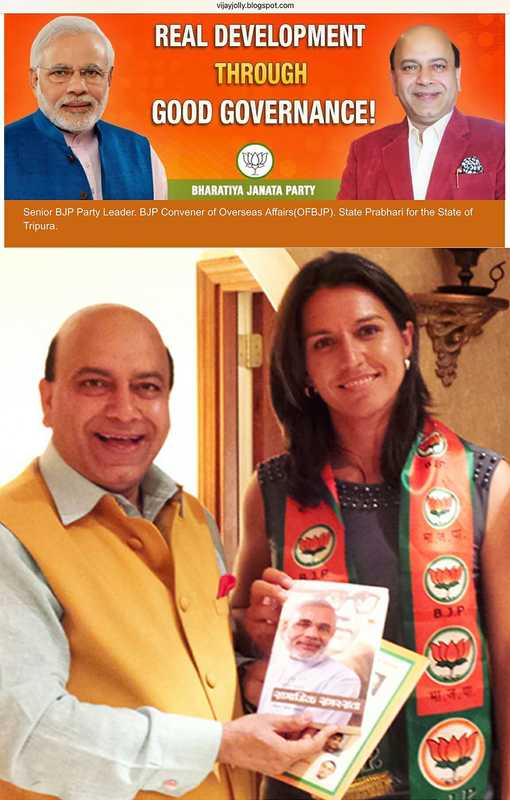
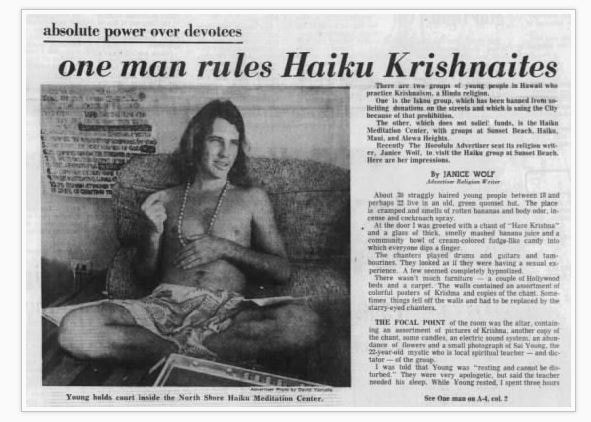
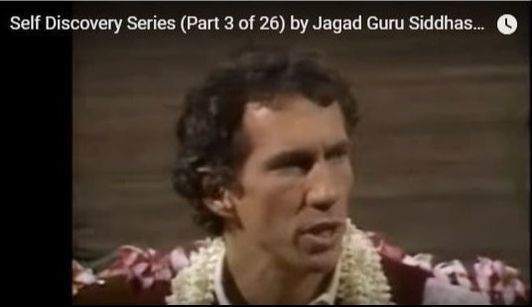
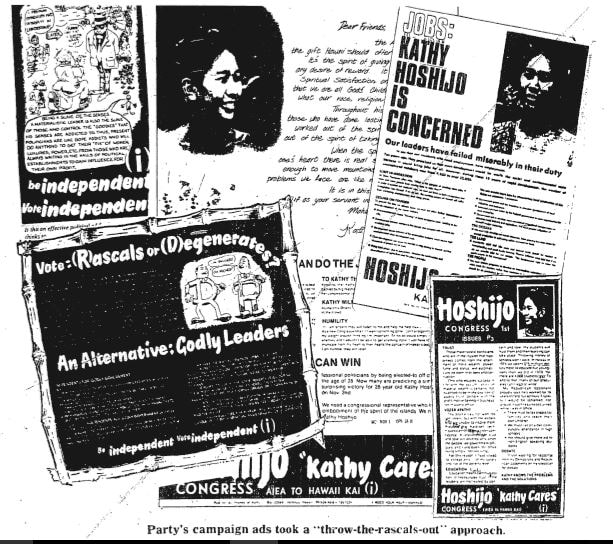
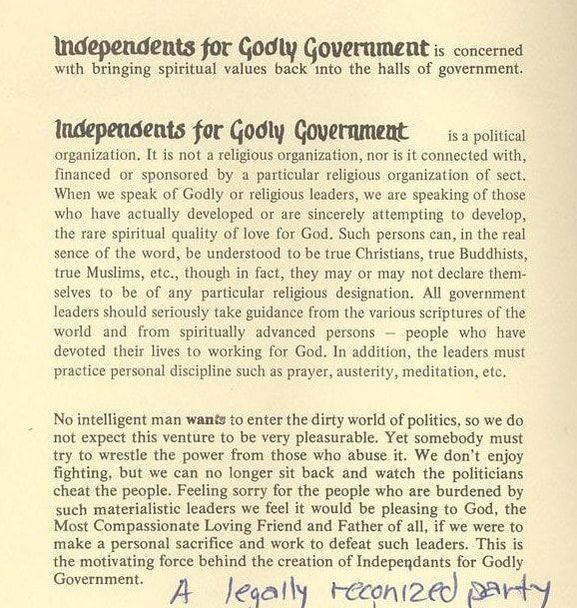
 RSS Feed
RSS Feed